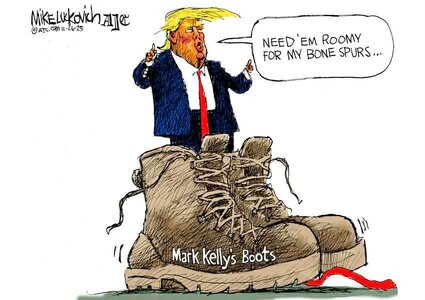- Messages
- 3,653
Navigation
Install the app
How to install the app on iOS
Follow along with the video below to see how to install our site as a web app on your home screen.
Note: This feature may not be available in some browsers.
More options
You are using an out of date browser. It may not display this or other websites correctly.
You should upgrade or use an alternative browser.
You should upgrade or use an alternative browser.
Trump goes bananas over Dem message to military re: illegal orders
- Thread starter nycfan
- Start date
- Replies: 180
- Views: 6K
- Politics
donbosco
Legend of ZZL
- Messages
- 6,928
My strong sense of it is that the tweeters, when from the USA rather than ‘bots’ are disgusting creatures as well.The comments under this tweet are disgusting.
UNCBAdookJD
Esteemed Member
- Messages
- 586
This may be relevant:
This isn’t surprising. I don’t want to dox myself and give my exact credentials, but I’m a bit of an expert in Law of Armed Conflict and this situation is like a basic exam question on the topic. Very basic.
UNCBAdookJD
Esteemed Member
- Messages
- 586
On the topic of unlawful orders it is very easy to think of hypothetical orders that would be unlawful that could come from the White House:
- Orders to commit genocide
- Orders to kill non-combatants or to disregard the distinction between combatants and non-combatants (a combatant is someone who is a member of an opposing nation’s armed forces, a member of a declared hostile force such as the Taliban, or someone who is directly participating in hostilities)
- Use of munitions banned by a treaty the United States has signed and ratified
- Violating the Geneva Conventions by killing or abusing enemy prisoners of war, the sick/wounded, shipwrecked/marooned sailors, etc.
- Orders to violate the posse comitatus act by engaging in domestic law enforcement activity
- Orders to exceed the scope of a congressional authorization for the use of force (think operations in Laos/Cambodia during Vietnam).
Now, I would not expect a junior enlisted Soldier to be making the call on most of these. As the Bulwark article linked previously mentioned, this is primarily a job for officers. Commanding officers down to the battalion level have access to lawyers to advise them on the legality of orders (a company commander even could access the battalion or brigade’s lawyer if needed). They also receive extensive training from Judge Advocates on the laws relevant to their decision-making authority upon taking command.
- Orders to commit genocide
- Orders to kill non-combatants or to disregard the distinction between combatants and non-combatants (a combatant is someone who is a member of an opposing nation’s armed forces, a member of a declared hostile force such as the Taliban, or someone who is directly participating in hostilities)
- Use of munitions banned by a treaty the United States has signed and ratified
- Violating the Geneva Conventions by killing or abusing enemy prisoners of war, the sick/wounded, shipwrecked/marooned sailors, etc.
- Orders to violate the posse comitatus act by engaging in domestic law enforcement activity
- Orders to exceed the scope of a congressional authorization for the use of force (think operations in Laos/Cambodia during Vietnam).
Now, I would not expect a junior enlisted Soldier to be making the call on most of these. As the Bulwark article linked previously mentioned, this is primarily a job for officers. Commanding officers down to the battalion level have access to lawyers to advise them on the legality of orders (a company commander even could access the battalion or brigade’s lawyer if needed). They also receive extensive training from Judge Advocates on the laws relevant to their decision-making authority upon taking command.
How much has the disruptions with some of those legal officers affect access to such guidance?On the topic of unlawful orders it is very easy to think of hypothetical orders that would be unlawful that could come from the White House:
- Orders to commit genocide
- Orders to kill non-combatants or to disregard the distinction between combatants and non-combatants (a combatant is someone who is a member of an opposing nation’s armed forces, a member of a declared hostile force such as the Taliban, or someone who is directly participating in hostilities)
- Use of munitions banned by a treaty the United States has signed and ratified
- Violating the Geneva Conventions by killing or abusing enemy prisoners of war, the sick/wounded, shipwrecked/marooned sailors, etc.
- Orders to violate the posse comitatus act by engaging in domestic law enforcement activity
- Orders to exceed the scope of a congressional authorization for the use of force (think operations in Laos/Cambodia during Vietnam).
Now, I would not expect a junior enlisted Soldier to be making the call on most of these. As the Bulwark article linked previously mentioned, this is primarily a job for officers. Commanding officers down to the battalion level have access to lawyers to advise them on the legality of orders (a company commander even could access the battalion or brigade’s lawyer if needed). They also receive extensive training from Judge Advocates on the laws relevant to their decision-making authority upon taking command.
UNCBAdookJD
Esteemed Member
- Messages
- 586
Access isn’t really hampered. The fired 3 stars (positions now downgraded to 2 stars), didn’t really advise individual units, that’s lower level attorneys (divisions and corps generally have an O-6 colonel advising the commander directly along with a team of 10-15 attorneys working for the colonel), a brigade typically has an O-4 major advising the commander, and a battalion can either have their own advisor or access to the brigade’s. The firing of the TJAGs was more symbolic than practical in that it was a message to ignore your attorney if they give you advice that contradicts the orders you’ve received. So it’s not an issue of access, it’s one of messaging.How much has the disruptions with some of those legal officers affect access to such guidance?
evrheel
Esteemed Member
- Messages
- 587

'People Are Very Scared': Trump Administration Purge of JAG Officers Raises Legal, Ethical Fears
Military lawyers and legal experts told Military.com the administration's firings of the Air Force, Army and Navy's top judge advocates general politicizes and sets an alarming precedent for a crucial job in the military.
Hegseth told reporters Monday that the removals were necessary because he didn't want them to pose any "roadblocks to orders that are given by a commander in chief."
Centerpiece
Inconceivable Member
- Messages
- 3,375
- Messages
- 4,091
Last edited:
- Messages
- 5,957
Fucking mirrors, how do they work?
TangledUpInBlue06
Esteemed Member
- Messages
- 737
If Stephen Miller has a reflection in one, it's brokenFucking mirrors, how do they work?
theel4life
Inconceivable Member
- Messages
- 2,742
- Messages
- 4,091
Mirrors are dangerous...Fucking mirrors, how do they work?
I busted a mirror and got seven years bad luck, but my lawyer thinks he can get it reduced to five.
- Messages
- 41,297
Share:






